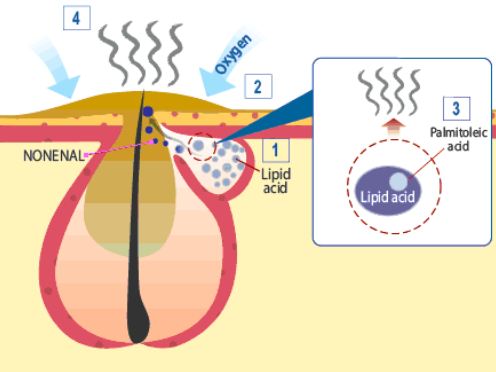Nonenal
(now · nee · nuhl) is a common body odor caused by aging as antioxidant defenses weaken.
Check out our Nonenal cartoon 👇
What Is The Science Behind Nonenal?
How Is Nonenal Produced?

1. Lipid acid (oil) is produced.
2. It gets oxidized.
3.The oxidation happens more quickly than in the young because natural antioxidants deteriorate with age.
4. Nonenal (now · nee · nuhl) occurs.
How Can You Recognize Nonenal?
Nonenal odor has an unpleasant grassy or greasy odor. It is often hard to detect on oneself, but will linger on fabric such as shirt collars and pillow cases. Nonenal odor often persists in confined environments, such as nursing homes, and hence is sometimes referred to as “old people’s smell”. While familiar to physicians in Japan, nonenal remains little known in the U.S. The Japanese have an open and healthy attitude towards aging odor, which they refer to as “kareishu”.
Because it is oil (fatty acid) based, Nonenal is not easily removed by convention soap and water.
When Does Nonenal Production Start?
Usually around age 40, when the skin’s antioxidant defenses start to weaken. Although most may think body odor comes from poor hygiene, that's not always the case as it can also come from age-related body changes.
How Is Nonenal Different From Regular Body Odor?
There are two distinctly different sources of Body Odor:
1. Sweat (apocrine and eccrine) glands which secrete “sweat”, comprised of water and organic substances that provide a fertile environment for bacterial growth. Bacterial breakdown of sweat compounds results in traditional body odor. Since sweat is water based, this type of body odor is easily removed with soap and water.
2. Sebaceous glands which produce lipids (fatty acids) which “oxidize” with oxygen in the air, and are transformed into an organic compound, Nonenal, which produces its own unique body odor. As our skin’s anti-oxident defenses naturally decrease with age, Nonenal formation–and resulting odor–may increase. Unlike sweat, lipid acids are not water soluble, and therefore remain on the skin despite intense scrubbing. This also explains why Nonenal persists in even the cleanest environments.
Does Nonenal Affect Men And Women Differently?
1. Many women experience changes in body odor during menopause. This can be a combination of both increased sweat-based odor, as well as Nonenal-based odor, which can result in confusion and frustration when the odor cannot be easily eliminated. Hot flashes and night sweat during menopause cause excessive perspiration and increased fatty acids, resulting in Nonenal.
2. A recent Swedish study showed that middle aged men often have the worst body odor amongst all age groups. This could be due to higher testosterone ratios in men and related Nonenal production.
3. Stress can exacerbate the production of Nonenal in both women and men.
How Does Persimmon Extract Eliminate Nonenal?
Soaps with Persimmon Extract eliminate 97% of Nonenal instantly compared to conventional soaps.
In addition, the powerful anti-oxidant properties of purified Japanese Green Tea extends the effectiveness of the Persimmon Extract to provide all day freshness and deodorant protection.
Persimmon Extract (or tannin) dissolves nonenal, thereby eliminating its odor. Persimmon fruit is a potent antiseptic loaded with vitamins and has been used by the Japanese for its naturally purifying and deodorizing benefits.
REFERENCES:
1. Lipid Peroxidation Generates Body Odor,Journal of Biological Chemistry
2. Download PDF:“Odor Associated with Aging” from Anti-Aging Medicine
3. Do Older People Actually Smell Different? Healthline
4. The Smell of Age: Perception and Discrimination of Body Odors of Different Ages



